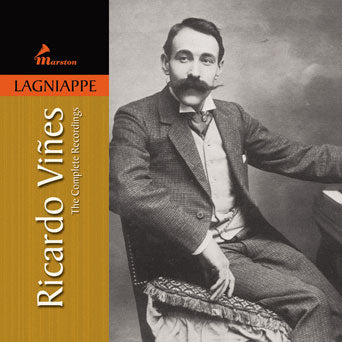Ricardo Viñes:
The Complete Recordings



| Total time: 68:40 | ||
SCARLATTI: |
||
| 1. | Sonata in D, K. 29 (L. 461) | 2:37 |
| (WL 1742) Columbia D 13102 | ||
GLUCK-BRAHMS: |
||
| 2. | Gavotte in A | 2:48 |
| (WL 1741) Columbia D 13102 | ||
BORODIN: |
||
| 3. | Scherzo in A-flat | 3:25 |
| (WL 2204-1) Columbia LF 41 | ||
DEBUSSY: |
||
| 4. | Soirée dans Grenade (from Estampes) | 4:02 |
| (WLX 1150) Columbia D 15245 | ||
| 5. | Poissons d’or (from Images, Book 1) | 3:22 |
| (WL 2203-3) Columbia LF 41 | ||
BLANCAFORT: Le Parc d’Attractions |
||
| 6–7. | L’Orgue du Carroussel/Polka de l’Equilibriste | 2:19, 1:37 |
| (WLX 1146) Columbia LFX 73 | ||
ALBENIZ: |
||
| 8. | Granada (Serenata), Op. 47 No. 1 | 3:35 |
| (WLX 1416) Columbia LFX 73 | ||
| 9. | Seguidillas, Op. 232 No. 5 | 2:43 |
| (WL 2331-1) Columbia LF 42 | ||
| 10. | Orientale, Op. 232 No. 2 | 3:04 |
| (WL 2330-1] Columbia LF 42 | ||
| 11. | Torre bermeja, Op. 92 No. 12 | 3:39 |
| (WLX 1147) Columbia D 15245 | ||
| 12. | Serenata española, Op. 181 | 3:22 |
| (OLA 1209-1) HMV DA 4885 | ||
| 13. | Tango in A Minor, Op. 164 No. 2 | 3:27 |
| (OLA 1208-1) HMV DA 4885 | ||
TURINA: |
||
| 14. | Miramar (from Chants d’Espagne) | 2:23 |
| (WL 1889) Columbia LF 12 | ||
| 15. | Dans les Jardins de Murcia | 2:13 |
| (WL 1888) Columbia LF 12 | ||
FALLA: |
||
| 16–17. | Dance of Terror/ Récit du Pêcheur | 2:16, 2:02 |
| (WLX 1166) Columbia LFX 72 | ||
| 18. | Introduction and Ritual Fire Dance | 4:15 |
| (WLX 1167) Columbia LFX 72 | ||
ALLENDE: |
||
| 19–20. | Dos Tonadas Chilenas | 1:25, 1:45 |
| (OLA 1210-1) HMV DA 4910 | ||
TROIANI: |
||
| 21. | Milonga | 1:22 |
| (OLA 1211-1) HMV DA 4910 | ||
LOPEZ-BUCHARDO: |
||
| 22. | Bailecito | 1:32 |
| (OLA 1211-1) HMV DA 4910 | ||
Appendix |
||
DEBUSSY: |
||
| 23. | Hommage à Rameau (from Images, Book I) | 3:02 |
| (incomplete; measures 31-76 only) | ||
| 24. | Etude No. 10, “Pour les sonorités opposées” | 2:37 |
| (incomplete; measures 31-75 only) | ||
| 25. | Ricardo Viñes speaks on Debussy [translation] | 3:36 |
| (radio address commemorating the 20th anniversary of Debussy’s death) | ||
|
|
||
|
Tracks 1-11 and 14-18 recorded 1930; Tracks 12-13 and 19-22 recorded 22 July 1936; Tracks 23-24 dates unknown; and Track 25 recorded 1938. |
||
Producer: Donald Manildi
Audio Conservation: Ward Marston
Audio Assistance: J. Richard Harris
Photograph: Gregor Benko
Booklet Design: Takeshi Takahashi
Marston would like to thank Donald Manildi and The International Piano Archives at Maryland for providing the 78 rpm commercial recordings and Jonathan Summers and the British Library Sound Archive for providing the appendix material.
Although Ricardo Viñes (1875—1943) was active during the “golden age” of pianism, he deliberately pursued an entirely different musical path from his fellow practitioners. He is perhaps best categorized with the Catalan school of pianists, a group of formidable players that included Albéniz, Granados, Malats, Mompou, and de Larrocha. It goes without saying that Viñes became one of the leading interpreters of the Spanish piano literature. However, his affinities also extended to many French, Russian, and South American composers of the day. Generally eschewing the familiar Austro-German and Slavic repertoire of most pianists, Viñes campaigned tirelessly for new and recent works, introducing them throughout Europe and South America.
Viñes’s earliest teacher was Juan Pujol in Barcelona. At the suggestion of Albéniz, he traveled to Paris at the age of 12, enrolling in the Conservatoire class of Charles Bériot. There he met Maurice Ravel, his exact contemporary. It was not long before Viñes developed strong professional relationships with Debussy and Sévérac, later with Fauré, Satie, and Les Six. (Of the latter group, Francis Poulenc took piano lessons from Viñes; another pupil was Marcelle Meyer.)
This CD is the first to contain Viñes’s entire recorded output. He reportedly carried an intense dislike for the recording process, and consequently there are many works which should have been recorded by him. Nonetheless, the color and authority of Viñes’s playing is clearly evident, and these sonic documents, all dating from 1930—1936, give us a glimpse of how he earned the esteem of colleagues and audiences.
© Donald Manildi, 2007